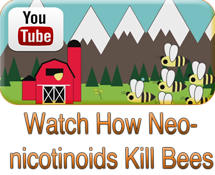6 November 2014 New study shows harm of neonicotinoids on Bumblebees
A new study shows harm of exposure of bumble bee colonies to thiamethoxam or clothianidin seed-treated maize.
Interestingly, the study is funded by Bayer Canada and Croplife Canada (more information here). Cynthia Scott-Dupree, one of the authors, is known for being supported by Bayer for years and her research systematically concludes "no effect of neonics to bees". In this article (no free access unfortunately), the authors demonstrate that bumble bee colonies exposed to neonicotinoid seed treated maize present significantly fewer worker bees. Surprisingly, despite this finding that is statistically relevant, the authors conclude there is low risk for bumble bees. The resilience of a bumble bee colony directly depends on the strength of its population. Furthermore, in this study, environmental conditions were such that bumble bees visited more wild flowers than maize flowers (representing only maximum 2.6% of the pollen brought back to the hive). A different experimental design exposing better bumble bee nests to maize pollen would possibly have provided more dramatic figures. We also noticed that the design of the experiment is very poor: only 3 bumble bee colonies were placed next to 4 different conventionnal and 4 organic fields.

